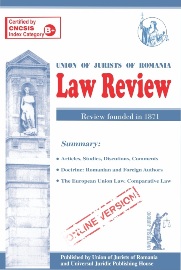- Scientific Life
Gender equality in public administration and political functions in Romania
The subject of gender equality in public administration and political functions in Romania is not often addressed in the specialized literature, although it represents a key element in the development of a society in relation to the sustainable development goals and the strategies found at the international level. Moreover, the analysis of national legislation on equal opportunities and equal treatment between women and men should be of interest to both theorists and practitioners. Gender equality is not a new element for public administrations, as it has been enshrined in the Universal Declaration of Human Rights since 1948, but the development and modernization of societies has brought this issue into the spotlight particularly in recent decades, both internationally and in Romania. Achieving a gender balance in decisionmaking and politics is one of the key objectives of the European Union Strategy on Gender Equality for 2020-2025, which is why it is important to present the situation in Romania and identify possible directions for action. It is also in line with Sustainable Development Goal number five (Agenda 2030) on gender equality and can also be linked to Sustainable Development Goal number 16 on developing effective, accountable and inclusive institutions. Thus, human resources are a key element in the development of public administrations and the political life of a state, and measures impacting on them must take gender equality into account.
Volume XIII, issue 1, January-June 2023 2023

Summary
European Union Law
Administrative practices as an infringement of the law of the European Union
Overview on the criminal justice system in Bulgaria. Comparative law. A Bird’s Eye View
The profession of legal advisor in european countries
Legal regime of competition in Slovenia
International Law
Ruscism – A threat to international legal order and the security of all humanity
